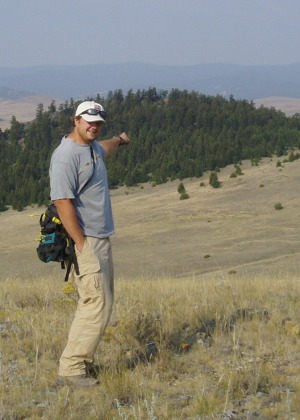Calling All Anthro Alums...
Please send pictures and stories from your time at PLU so we can post them here and recreate our joint history. Send your memories to andrewbw@plu.edu.
Grace Atkins (2023)
Hi, I’m Grace and I graduated with degrees in Anthropology and Biology and spent my summer after graduation working as a Park Ranger at the Mount St. Helens National Volcanic Monument. My love for rangering is something I was only able to discover because of my time as an Anthropology student at PLU. During my time at PLU, I took an internship opportunity at Mount Rainier National Park doing curation and archaeology work. Not only did I get to explore my anthropological interests and start building experience in artifact handling, research, and curation techniques, but I also learned how to help people connect to the natural world around them. I realized interpretive park rangering is a perfect overlap of anthropology and biology!
The anthropology program provided me with further opportunities to exercise my new skill set, such as helping with an archaeological collection project at PLU, and by giving me knowledge in anthropological/archaeological theory. I thoroughly enjoyed my time as an anthropology student and will now continue utilizing what I learned in the program as a Park Ranger at Grand Canyon National Park. At my site in the park, Desert View, I’ll be working closely with indigenous communities, hosting cultural demonstrations for the public and doing podcast interviews with tribal members.
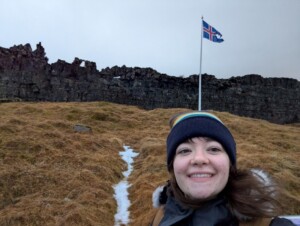
Hannah Harvey (2023)
I graduated from PLU in 2023 with bachelor’s degrees in Anthropology and Global Studies. I knew I wanted to work in a nonprofit in a community I cared about, so I moved back to my hometown of Juneau, Alaska and started working at an emergency shelter for runaway and homeless youth ages 10-17. I started as a basic youth development leader, helping with the day-to-day operations of the shelter like cooking dinner and hanging out with kids, but quickly moved up to working as an advocate, or case manager, for the kids coming to the shelter. This involved connecting kids to mental health resources, coordinating with OCS to find placements for kids in state custody, supervising family mediations, and working with kids on the problems that brought them to shelter. Now, I am the Outreach Coordinator and Shelter Administrator. I have been working on developing advertising materials for the shelter, getting the word out in the community, meeting with school counselors and hosting lunch groups in the schools to connect with potential kids, applying for grants, starting a Safe Place program in Juneau, and much more! I’ve used my background in anthropology to learn more about how mental illness, substance use, poverty, and childhood trauma impact at-risk youth in our communities and develop better practices for addressing them. It has been incredibly rewarding to do this work in my home community and I hope to continue making Juneau a better place for our kids!
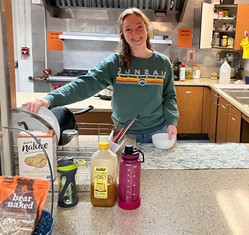
Venice Jakowchuk (2023)
I graduated from PLU in 2023 with a double major in history and anthropology. I just completed my Masters of Science in Archaeology with distinction from the University of Edinburgh in Scotland. What sparked my interest in archaeology was the anthropology courses I took at PLU. These courses helped me in developing core skills in engaging and conducting research in academia, which inspired me to continue my education after PLU. Furthermore, the smaller class sizes at PLU really allowed me to develop close relationships with my professors, which was fundamental to my academic and personal growth. These relationships allowed me to conduct faculty-led research, be a teaching assistant, and gain experience doing artifact curation. These activities helped cultivate my passion and opened the window for several opportunities such as working as an archaeological field technician and now a MSc Archaeology postgraduate. I am forever thankful for the Anthropology Department at PLU for helping me find my vocation and providing me with the tools to pursue it.
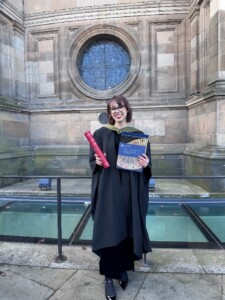
Brooke Nelson (2023)
I graduated from PLU in 2023 with a double major in Anthropology and Religion alongside minors in Dance, Hispanic Studies, and the Peace Corps Prep certificate program.
I am currently (August 2024–July 2025) living in Buenos Aires, Argentina, and working as a volunteer through the ELCA’s Young Adults in Global Mission (YAGM) program. Most of the work at my site placement centers around youth programming in the Lutheran congregation I’m paired with – from assisting with behind-the-scenes prep to accompanying groups of elementary schoolers through day camps, First Communion, or Confirmation classes. I also spend a lot of time with other young adults in the congregation: hanging out, engaging in deep conversations about the world and our lives, and sharing mate (a traditional Argentinian drink!). If you want to read more about my YAGM year, you can find my newsletters here: https://sites.google.com/view/brooke-en-argentina
I majored in Anthropology at PLU because I found learning about other cultures fascinating, which ultimately played a huge role in applying and participating in the YAGM program. I learned about YAGM during my freshman fall semester at PLU, which piqued my interest immediately. Not only has it been a perfect combination of all my passions, but I find myself using what I learned in PLU ANTH classes daily. I approach my life here through the participant-observation mindset and have gained so much insight into Argentinian culture through what my friends in my host community share with me. I am eternally grateful for the perspectives and knowledge I gained in my PLU ANTH classes, and how I carry them with me everywhere even now.
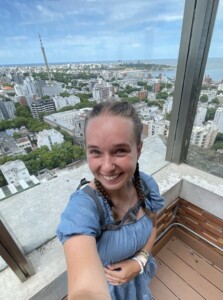
Ian Farrell (19)
I graduated from PLU with a degree in Anthropology in 2019. After a few tumultuous years due to the ensuing pandemic, I finally saved enough money for field school and took a shot in the dark and attended the University of Utah’s Range Creek Archaeological Field School in 2021. This was a massive stroke of luck, and I’ve now had the opportunity to pursue a master’s and
doctoral degree in archaeology at the University because of support from the director of the Range Creek Field Station. Although I might attribute many of these opportunities to being in the right place at the right time, I had to be the right person for them as well. The anthropological training I received at PLU shaped me into the right person for those opportunities. The classes, mentors, and research opportunities I had in the program helped me learn how to develop strong research questions and critical thinking skills that have been invaluable throughout my academic career.
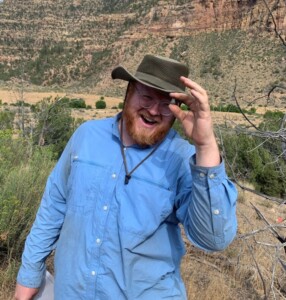
Kyle Edward Fahey (18)
I graduated from PLU with a BA in cultural anthropology. Upon graduation, I headed off to Gainesville, Florida with my partner and two daughters to start a PhD program in anthropology at the University of Florida (UF). I completed my MA at UF in 2021 as a Foreign Language and Area Studies Fellow and then officially advanced to continuing UF’s PhD program in anthropology where I am a current graduate student. During my time at UF, I performed fieldwork in Addis Ababa, Ethiopia in 2019, 2023, and 2024 with support from the Elizabeth Eddy Summer New Graduate Student Research Grant, the Paul and Polly Doughty Research Award, and UF’s Center for African Studies Pre-Dissertation Research Award. My current research is multi-sited, combines my fieldwork and archival research in Addis Ababa, Ethiopia with fieldwork in Tokyo, Japan, and aims to address the manner and extent in which the Ethiopian diaspora community in Tokyo may use cultural forms of gastronomy to bridge social and cultural divides while residing abroad.
Throughout my time at UF I have gained valuable experience in teaching and mentoring within International Studies, Anthropology, and Forensic Anthropology. Between the Spring and Fall of 2025, I served as the Laboratory Coordinator and the Quality Assurance Coordinator at UF’s C.A. Pound Human Identification Laboratory where I spent hands on time within all aspects of an active forensic laboratory while also training and mentoring undergraduate student volunteers. In all of my experiences in continuing engagement within the field of anthropology, I have drawn significantly on the anthropological training and mentorship that I received from the faculty at PLU. The four field approach to education and training that PLU’s anthropology program provided allowed me to pivot, adapt, and grow in beneficial ways that I could not have predicted. Beyond this, it is the mentorship and leadership that the anthropology department’s faculty provided that I also hope to model to all of the students that I may have the opportunity to mentor and teach as I continue on in my academic career. I am immensely grateful to every faculty member in the department of anthropology that I had the pleasure to learn from while at PLU and the time, energy, and devotion that they provide for their students!
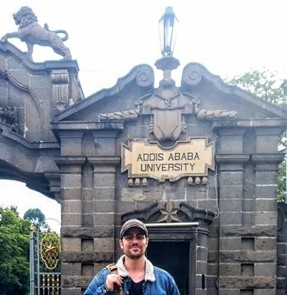
Paris M. Franklin (18) (she/her/hers)
I hold a BA in Anthropology from Pacific Lutheran University (PLU) and an MA in Anthropology from the University of Wyoming. I am currently a PhD student in the Anthropology Department at McGill University in Montréal, Québec, Canada. For my dissertation research, I am working alongside a First Nation community in British Columbia to better understand diet along the Pacific Coast prior to colonization. Before beginning my PhD program, I worked as a full-time archaeologist for the Seattle office of Willamette Cultural Resources Associates and the Museum of Natural and Cultural History in Eugene, Oregon.
I would not have become an archaeologist or pursued additional anthropology degrees if I had not attended PLU; I came in as an undeclared major, but found anthropology through an engaging general education course taught by an archaeologist. I immediately dove into other classes in the department and declared my anthropology major by the end of my first year at PLU. One of my favorite parts about studying anthropology at PLU was the opportunity to work closely with the fantastic faculty and explore my intellectual curiosities through the department’s four field approach. I am also grateful for the opportunities I had to learn how to conduct independent archaeological research and the many professionalization opportunities in the program. I genuinely realized my professional passions and met some of my favorite people because of my time in the anthropology department at PLU!
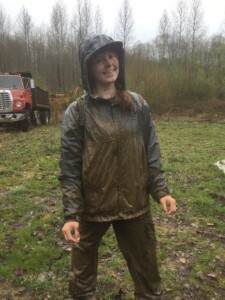
Quenessa Long (18)
I graduated from PLU with a double major in Anthropology and Political Science. I also participated in the international honors (“IHON”) and Act Six Program(s). In 2023, I graduated from Howard University School of Law with my Juris Doctor and I am currently a licensed practicing attorney in Washington, D.C.
When I entered PLU, I knew that I wanted to major in Anthropology because I watched the show ‘Bones’ and thought I wanted to be like the main character. Although I did not become the forensic anthropologist I thought I would be, I am grateful that I majored in Anthropology because my studies opened me up to learning how to approach the world in thoughtful and explorative ways. Studying anthropology has enhanced my legal practice by sharpening my ability to analyze complex human interactions, cultural contexts, and societal structures—essential skills for understanding clients, crafting persuasive arguments, and navigating legal disputes. The Anthropology professors and curriculum at PLU required critical thinking, and this prepared me to assess cases from multiple perspectives, recognize biases, and approach legal issues with a more holistic and culturally informed mindset. The opportunity to study anthropology at PLU was special and I am grateful I had the experience.
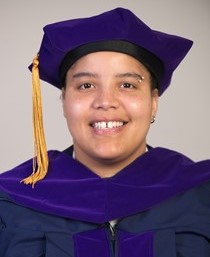
Georgia Abrams (17)
I graduated from PLU with a BA in Anthropology in 2017, and since 2021 I’ve been working at the Illinois State Archaeological Survey (ISAS) at the University of Illinois. ISAS is one of the largest archaeological research and compliance organizations in the U.S. and houses some of the region’s earliest collections, as well as collections from sites with international significance. As a Collections Specialist, my time is spent rehousing legacy collections, ensuring ethical use of our collections for outreach and education, mitigating the ongoing nationwide “curation crisis,” and preparing NAGPRA-eligible collections for tribal consultation and repatriation. One of my current objectives is the research of primary documents from early investigators of Cahokia, like Warren King Moorehead, to better understand the provenience of our Cahokia collections.
I transferred to PLU knowing that I wanted to pursue anthropology but unsure of what exactly to do with it. The dedicated instructors led me to opportunities that gave me valuable experiences both in the field and at conferences, while the engaging coursework strengthened my critical thinking and helped shape the ethical values that guide my career today.
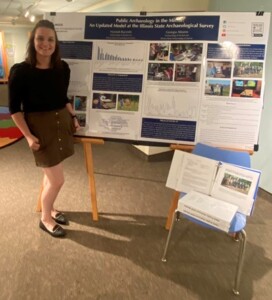
Emma Holm (17)
I graduated with a double major in Anthropology and Biology and a minor in Geoscience. From 2019 to 2021, I attended Northern Arizona University in Flagstaff, Arizona where I earned a Master of Arts in Applied Archaeology. After working multiple seasons as a temporary archaeological technician for the National Park Service, the U.S. Forest Service, and private firms, I have served as the District Archaeologist for the Hayfork & Yolla Bolla Ranger Districts of the Shasta-Trinity National Forest since January 2023. Since May 2024, I have also filled this role for the Forest’s Weaverville and Big Bar Ranger Districts. Together, these four Districts compose the 1.2 million-acre “Trinity” part of California’s largest National Forest. As a member of the Forest’s Heritage Program, I steward cultural resources on the Districts’ footprints (including archaeological sites; historic buildings and structures; culturally significant places; and Tribal resources) by considering the effects of planned projects to these resources through the principles of Cultural Resource Management and Tribal consultation, and by then mitigating identified adverse effects.
The promise of the PLU Anthropology Department’s small class-sizes; student-faculty research; and real-world learning opportunities heavily influenced my decision to attend the university. I discovered archaeology at a young age, and I searched out a collegiate and departmental setting that would support my exploration of anthropological archaeology as a profession, in both thought and practice. While attending PLU, I had the opportunity to complete student-faculty research into Native American forager subsistence practices on the mountain now widely known as Mount Rainier, present this research at conferences, and complete an internship with the Cultural Resources Department at Mount Rainier National Park. Collectively, these experiences gave me critical exposure to practicing archaeology as a public land manager, and the contributions of such practitioners to the curation of American Heritage. I am incredibly grateful for the education and experiences I received through the PLU Anthropology Department!
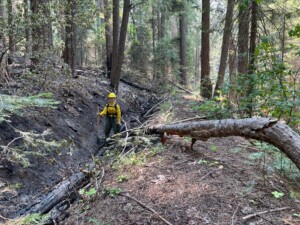
Ellie Lapp (17)
I graduated from PLU in 2017 with a double major in Anthropology and Global Studies and a minor in Hispanic Studies. During my time at PLU, I had the opportunity to study abroad in Northern Ireland, Mexico, and Norway. These were unforgettable experiences that deepened my understanding of culture, identity, politics, and global systems. Since graduating, I’ve worked for the UN Refugee Agency in D.C., studied poverty and inequality across the U.S. as a research fellow on a sociology study, and then found my way to my new home in Denver, Colorado. I spent the past few years leading the communications work of a statewide, multifaith nonprofit and now serve as the Deputy
Communications Director with the Colorado Senate Democrats. PLU—and especially my anthropology courses— taught me so much about the world and gave me the tools to think critically about how we represent people and tell their stories ethically. That foundation has shaped my career, fueled my curiosity, and taken me on some pretty incredible adventures.
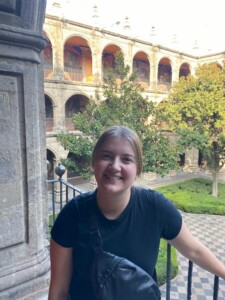
Sara Stiehl (2014)
“Never doubt that a small group of thoughtful, committed citizens can change the world. Indeed, it is the only thing that ever has.” ― Margaret Mead.
A small group of thoughtful, committed citizens that can change the world is exactly what Pacific Lutheran University has in its Anthropology Department.
Having had the pleasure to interact and take classes from each of the Anthropology faculty members from 2009 to 2014, I must acknowledge that not only does each of these faculty members specialize in their own fields and regions, but they also have their own unique sense of humor, engagement, and way of teaching.
The secret was finding out how they taught and creating a hybrid between their style and my learning style. This offered the best opportunity to get to know not only the topic being taught, but the individual standing at the front of the room. Once I took the time to get to know the professors, a world of stories, laughter, and knowledge far beyond recognition was exposed to me.
This can be seen through the excitement that Akiko Nosaka brings when she teaches East Asian Cultures as she draws Japanese characters on the board, breaking down their symbolic value, and weaving personal stories into her lectures. You’ll find Bradford Andrews, the man with two first names, placing his own unique humor into each PowerPoint in Introduction to Biological Anthropology. Laura Klein will wear a piece of jewelry that always has a tale to tell, and she’ll casually tell stories in Anth 480 about the time she interacted with some of the great names in Anthropology. Walk into David Huelsbeck’s office and you’ll find artifacts from the Makah reflecting his time on Ozette beach. Have the honor of going to Neah Bay with him and you’ll find that your professor is one of the most respected and loved people by the Makah Nation. Sit down for a discussion with Elizabeth Brusco and even if your topic of interest isn’t in her direct line of research, it is guaranteed that you will walk out with a new clarity on your ‘big question’ along with four other anthropologists to read. Taking Nation, State, and Citizen with Steven Thomson, you’ll find yourself learning more about the world around you, its structure, power, and politics through real life examples of abiding traffic laws to his travels in the Gambia, than you could ever get through years of self study.
Each professor offers a piece of themselves in their classes and taking the time to get to know them, their passions, and their teaching styles offered me more than a new found passion in Anthropology; it offered me a multitude of mentors. These mentors assisted me on my travels to Neah Bay for Tribal Journeys, Akiak, Alaska to work on a alternative education summer school program designed to incorporate local knowledge to the Yup’ik youth, and with the time I spent in rural Thailand working with subsistence communities both as a student as a graduate. Each of these professors took the time to help me process my transformative time in Thai communities through finding comfort in those that had questioned development, marginalization, resistance, and politics before me. It was department that encouraged me to extend my network of anthropological peers by attending the American Anthropological Conference in San Francisco where I presented a poster on identity creation and resistance. It was the support of the faculty of this department that, even in times of transition, helped me to succeed in my classes and to successfully apply for graduate school. To this day, I experience continual motivation while on my current journey in graduate school at the University of Colorado Boulder in Cultural Anthropology.
The Anthropology program at PLU is a community, borderless and abundant. It extends far beyond place and time. Students maintain connections after graduation across the U.S and world, far beyond the reaches of the Xavier building. You grow with a cohort of peers throughout your time, solidifying your bond in Anth 480 as you dive into years of anthropological theory and continue supporting each other through your final capstone presentations in Anth 499. It is not only a community of relationships, but also of its own material culture. From the skeletons in the anthro lab decorated in their Hawaiian garb to the ‘idea’ notebooks you gain at the start of your question exploration, the department is its own community and has its own culture within PLU. The department’s complexity and uniqueness culminates at the end of the year bowling party, when I encourage those just about to graduate to stop and take a moment to just observe. Observe the new incoming majors timid and nervous to get to know their professors, the second or third years that causally talk to a professor or two before retreating to the safety of their peers, and then take a look at your own cohort. You will probably find yourself joking around with faculty about a theory paper that still needs work or a penultimate draft that is almost due. By the time you graduate, your years of hard work will have built respect and trust with your department peers, and the formalities between professor and student will have lightened. As the department continues to change and take new shapes, it will always have roots in the quirky individuals that love to learn and love to teach. I must say thank you to the Anthropology Faculty at PLU, for helping me find my niche and place within the discipline, I hope to see you all at an AAA conference in the future.
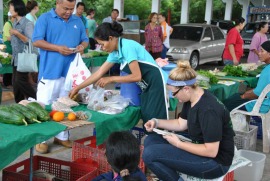
Yvonne Garton (2013)
My name is Yvonne Garton and I graduated from PLU in 2013 with a Bachelor’s of Art in Anthropology. I am grateful for many things in my life, however, I am most grateful for my PLU experience. PLU provides ample opportunities for its students to learn and experience outside the classroom. While earning my degree I studied away a total of four times. In my study away programs I had classes ranging from politics to environmental studies, languages to archaeology. The classes were all amazing and life changing, but what made the experience worthwhile were the skills I brought from PLU. The professors have so much passion for their subjects and there is an abundance of course topics to choose from. These classes showed me a new way to look at the rest of the world. Anthropology taught me how to think, categorize, ask questions, and interact with cultures other than my own. These skills have prompted me to travel and expand my learning outside of a traditional anthropology pathway. I have been accepted into a Screen Media Masters program at the University of Birkbeck in London, where I am going to further my anthropology skills and adapt them to making a product all cultures can enjoy.
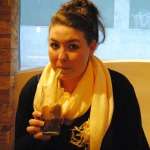
Elizabeth Kurtenbach (2012)
When I graduated from PLU in 2012 with my anthropology degree, my parents told me: “you’ll never find a job.” Challenge accepted.
Fast forward almost two years, now I work for Bank of New York Mellon – Analytics and Product Services Department in project management support. At the beginning of my senior year I was convinced I would go to graduate school in Applied anthropology, specifically Medical Anthropology. PLU provided the avenue for me to find one of my passions and I wanted to pursue it. Then my personal reality hit: I added up my student loan debt. It definitely wasn’t a number that made me happy about acquiring more debt in graduate school. So, pushing senior year dream aside, I made myself a new dream. Stay in Tacoma, get a “real job”, and don’t move in with my parent’s after graduation.
As anthropology majors you have many skills employers are looking for. It is all about how you spin it. Most companies are global, seeking employees who are adaptable and seeking employees who are culturally aware. My best interviews were when I focused on anthropology and shared how it could help their global business. Specifically how an anthropology major aids in cross-site communication. My office works with other offices in the UK and India on a daily basis. Honestly, when I created my new dream to stay in Tacoma and get a “real job” I thought I was putting my dream of practicing anthropology on the back burner. Boy was I wrong. I use my anthropology degree on a daily basis. From creating PowerPoints on cities to educate my co-workers on where our visiting associates are coming from, to using it to determine how the individual culture of a team works, to countless other daily tasks. Your anthropology degree can be used anywhere. You just have to think outside the box.
Good luck!
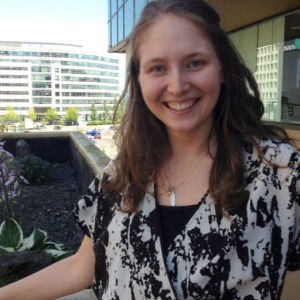
Hannah Rossio (2012)
After graduating in 2012, I decided to pursue a job in the education field. I have worked for two years in the Federal Way School District as an AmeriCorps member. I worked for one year in a middle school and a high school leading small groups and running an after school program. In my second year I lead an elementary after school program. Working as an AmeriCorps member has been a fabulous way to figure out if I enjoyed working in a school setting, and to develop my tutoring and teaching skills. I fell in love with algebra and geometry and am working towards going back to school to get my master’s degree teaching secondary mathematics. I work in a culturally diverse community and use my degree in anthropology on a daily basis. When I have the opportunity, I try to connect anthropology and archaeology to the subjects my students are learning. You would be surprised in how many ways it connects! I am excited to continue to use my background in anthropology in my next adventure, which is Nicaragua this summer!
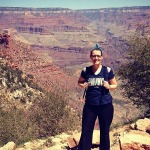
Megan Garbett (2010)
I graduated from Pacific Lutheran University in 2010 with a Bachelor’s degree in Anthropology. During my senior year, I began working at the PLU Archives and Special Collections and discovered my love for working with rare books, manuscripts, and artifacts. I went on to earn my M.A. in History-Archives and Records Management at Western Washington University. After graduation, I spent a year as a temporary processing archivist for the National Park Service in Tucson, Arizona. During my time there, I was processing records for Mesa Verde National Park, Rocky Mountain National Park, and Grand Teton National Park. My studies in archaeology came in handy here, as many of the records were archaeological reports and studies. I was recently hired as Archivist at the Point No Point Treaty Council in Poulsbo, which provides natural resource management and treaty rights preservation services to its member tribes. I have always felt that my love of anthropology led me down this career path. I use many of the skills I gained at PLU every day in attempting to understand the who, what, why, where, when, and how of the records I am working to preserve, and to understand the human element behind the paper.
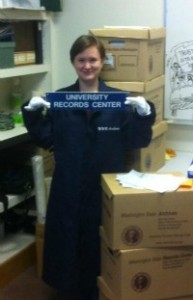
David Treichel (2010)
David graduated in 2010 with a degree in Anthropology. He moved to Houston, Texas, after graduation and began working as a temporary field technician for various cultural resource management firms in Texas. Currently, he holds the position of Field Director for a CRM firm called HRA Gray & Pape in Houston, Texas. This involves organizing and performing archaeological field surveys with a crew of field technicians, as well as artifact analysis and report writing. HRA Gray & Pape has multiple offices throughout the U.S., including an office in Seattle.
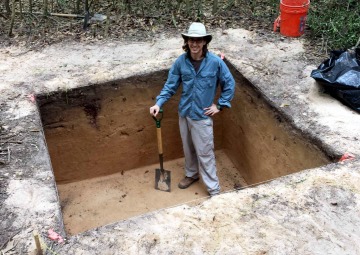
Erin McLaughlin (2005)
I graduated in Spring 2005 and immediately traveled back to Ireland to work and live. I worked at their National Coaching and Training Centre (University of Limerick) as an Event Coordinator, working with the Beijing Olympic Planning Committee on an International High-Performance Coaching Forum. I then moved to Dublin, Ireland to work with GTI Publishers on the Irish national graduate career website, GradIreland as an assistant event coordinator and sales representative. During my time in Ireland, my work with high-performance athletes stirred up my interest in psychology and mental health. I came back to the U.S. to begin a Masters program in Mental Health Counseling at the University of Northern Iowa. I am currently in my second year of coursework, and in May 2008, will be moving to Anchorage, Alaska to begin my internship with Hope Community Resources. My tentative plans are to begin research in psychological anthropology on the need for nature in holistic wellness. I was an AmeriCorps Naturalist with Hartman Reserve Nature Center this last year, nor that my emphasis in my masters program is in adventure therapy and nature therapy, If that could be added, it’d be great!
Life here is busy (if it weren’t, how boring it would be!) and very good. I am currently lining up my internship for this counseling program. I am going to be supervising an undergrad class on a May Term trip to Alaska for social work with Hope Community Resources. In gaining experience with that organization during the trip, it is pretty likely I will stay up there for my internship credit as a full-time therapist. Have you ever heard the saying “go and find where the world’s greatest need meets your greatest passion?” I feel like that is what is happening right now. Alaska is an amazing natural location, filled with adventure opportunities, and the cultural diversity is always of interest to me, as well as being able to provide support to the people. As I feel out the situation there, I am really hoping to consider a PhD track in psychological anthropology. However, at this point, my eyes are feeling a bit cross-eyed from all of my research and studying! 😉 I am the Graduate Assistant for my program. It’s fun (sometimes I question myself for enjoying being in the middle of the stacks at the library…).
April Reitan (2002)
After graduating from PLU 2002, I taught/tutored international and developmentally delayed students at Tacoma Community College. Since I also have a BS in Biology, I took a job at Fred Hutchison Cancer Research Center. I work in a group in Public Health Sciences which conducts cancer studies. Primarily, we conduct breast and ano-genital cancer studies, but we also have others like HPV-related, testicular, and skin cancer studies
Heidi Richardson-Topete (1998)
Since graduation in 1998 (has it already been nearly 10 years??!!) I have worked hard at being spontaneous and following my heart. As a result, I worked in international marketing for a couple of years and then decided to go to school for Interior Design. I started working for IKEA at the time as a means to pay for school. However, 8 years later, I’m still there and still loving it! Not only is IKEA an international company with a philosophy and vision I can support, it also allows me the opportunity to be paid to travel and satisfies my competitive side. I was married in 2001 to my husband, Gustavo, who is from Mexico. We currently have two beautiful girls, Alejandrina (3) and Sofia (1). Motherhood is unbelievable in every way. What a joy. What else can I say, life is good!
Kara J. Hurst (Holland) (1996)
I graduated from PLU in 1996, receiving my bachelor’s in Archaeology, and then worked in cultural resource management for two seasons (with two equally fun ski patrol seasons). I then went to Texas Tech University and earned my masters in Museum Science. After graduating, I became the curator at the Price Tower Arts Center, located in Frank Lloyd Wright’s only built skyscraper. Three years later I had the opportunity to return to the mountains and archaeology as the head registrar at the Natural History Museum of Utah in Salt Lake City. I was there 5 ½ years and enjoyed working with all of the divisions, as well as managing collections department interests for the new museum building that opened in 2011. During this time, I also was teaching Museum Collections Management as an adjunct professor at the University of Utah. In 2010, I joined the U.S. Department of the Interior, Bureau of Land Management, Utah State Office, as the museum curator for the Cerberus Action law enforcement investigation. I supported law enforcement’s efforts in the Four Corners region to stop the illegal black market artifact trade, destruction of archaeological sites, and desecration of Native American graves. I managed over 1,200 boxes of artifacts relinquished through plea deals with the convicted individuals, and consulted with tribes to help repatriate artifacts through the Native American Graves Protection and Repatriation Act (NAGPRA). In 2013, I accepted the position of supervisory registrar for the Smithsonian Institution’s National Museum of the American Indian in Washington D.C., and currently work to support the museum’s mission of preservation, outreach, and education.
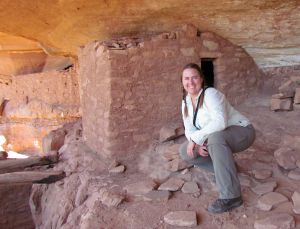
Derek Beery (1995)
Derek makes the news! Read the article here.
